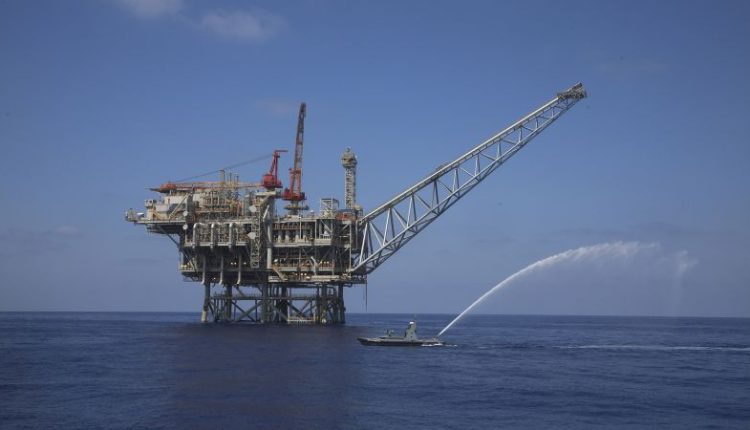Chevron said Monday that it had shut down a natural gas field off the coast of Israel at the behest of local officials, two days after Hamas militants launched their deadly assault on the country.
The Tamar field, located 15 miles off Israel’s southern coast, meets 70% of Israel’s energy needs for power generation, according to the US energy company.
A prolonged shutdown could lead to a drop in Israeli gas exports to its neighbors, Egypt and Jordan, as well as squeeze an already tight global gas market.
For now, Chevron (CVX) continues to supply its customers in Israel and the region with gas from the larger Leviathan platform.
“Chevron is focused on the safe and reliable supply of natural gas for the benefit of the Israeli domestic market and our regional customers,” Chevron spokesperson Sally Jones said in a statement. “Our top priority is the safety of our personnel, the communities in which we operate, the environment and our facilities.”
Jones said Chevron was “instructed” by Israel’s Ministry of Energy to stop production at the Tamar platform.
The closure of Tamar comes just as countries in the northern hemisphere head toward winter, when demand for natural gas to heat homes increases.
Futures prices on the Dutch Title Transfer Facility — Europe’s benchmark gas exchange — jumped 12% Tuesday to hit nearly €49 ($52) per megawatt hour. They have risen by a total of 29% since Friday, the last trading day before Hamas launched its unprecedented attack on Israel.
Analysts at energy consultancy Wood Mackenzie attribute the price rises mostly to the unfolding conflict in Israel.
Goldman Sachs analysts think the Tamar shutdown has “contributed” to the rally in European gas prices.
“Going forward, should the ongoing events evolve into a more sustained tightening of global LNG balances, this will reduce Europe’s gas markets’ ability to handle other unforeseen events, such as cold weather spikes, or other supply disruptions,” they wrote in a note Monday.
But Simone Tagliapietra, a senior fellow at the Bruegel think tank, points to two factors that he believes are more important in driving European prices higher.
One is a temporary shutdown of a gas pipeline in the Baltic Sea, and the other is planned industrial action by liquefied natural gas (LNG) workers in Australia, he told CNN.
On Sunday, Finland’s gas transmission operator announced that it had closed a key pipeline in the Baltic Sea transporting gas between Finland and Estonia due to a suspected leak. Then, on Tuesday, Chevron said it had received notice of strikes by some workers at two of its LNG facilities in Australia.
If the strikes, scheduled for later this month, go ahead, they will disrupt production at Chevron’s Wheatstone and Gorgon sites, which account for about 7% of global LNG supply, according to Wood Mackenzie.
A drawn-out shutdown at Tamar might add to the upward pull on European gas prices, Tagliapietra said, as it could force Israel to procure gas from the global market, fueling competition for exports.
“That might put upward pressure on the European gas price,” he said.
However, all in all, the consequences for the global gas market would be “very limited,” he added, because Israel isn’t a major supplier.
The more immediate impact of the shutdown at Tamar will be felt directly to Israel’s left and right — its neighbors Jordan and Egypt, which import 7% and 4% of their total gas supply from the platform respectively, according to Wood Mackenzie.
Although the Leviathan platform accounts for the bulk of Jordan’s total gas supply, a prolonged outage at Tamar could force Israel to divert Jordan-bound gas produced at Leviathan to its domestic market, Martijn Murphy, a principal analyst at Wood Mackenzie, told CNN.
And according to Zongqiang Luo, senior natural gas analyst at Rystad Energy, the Leviathan gas field has “limited capacity to ramp up production to compensate” for the loss of production at Tamar.
For Egypt, a prolonged shutdown at Tamar would also reduce the country’s ability to ramp up its LNG exports and “earn crucial hard currency,” Murphy said.
Egypt produces a lot of its own natural gas in addition to imports and processes some of it into LNG for shipping abroad.
Luo notes that Cairo’s LNG exports already dropped by about half during the first nine months of the year, compared with the same period in 2022.
“This drop can be attributed to increased local gas consumption within Egypt, driven by a surge in domestic demand during the summer months,” he said.
The International Energy Agency expects demand for gas in Egypt to grow by an average of 3.6% per year.
“This increase in domestic gas demand threatens Egypt’s LNG export ambitions and highlights the need to import gas by pipeline from Israel,” the agency said in a report Tuesday.
Read the full article here

